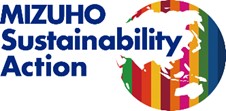April 3, 2023
Mizuho Financial Group, Inc.

Addressing Climate Change – FY22 progress & strengthening initiatives
Mizuho Financial Group, Inc. (President & CEO: Masahiro Kihara) today disclosed its "FY22 Sustainability Progress - Initiatives addressing Climate Change", which summarizes the details and progress of strengthening its efforts to address climate change.
The document outlines Mizuho's basic concepts and approaches, specific initiatives, quantitative results, progress in line with its targets, as well as details of the initiatives that have been strengthened this time around.
Based on the recently revised Net Zero Transition Plan, Mizuho will promote a more integrated, effective, and bolder response to climate change, working with our various stakeholders to realize a low-carbon society by 2050.
Link to the FY22 Sustainability Progress - Initiatives addressing Climate Change:
https://www.mizuhogroup.com/binaries/content/assets/pdf/mizuhoglobal/sustainability/overview/report/sustainability_progress.pdf (PDF/4,569KB)
Summary of Strengthening Initiatives
1. Revising our Net Zero Transition Plan
A. After considering risk management, proper capturing of business opportunities, and acceleration of transition to the real economy, we have revised our Net Zero Transition Plan (p.41) with the aim of promoting the Group's response to climate change in a more integrated manner going forward.
B. We will also strengthen efforts aimed at progressing the implementation and commercialization of new technologies and the redesigning of our economic and industrial environments (p.8), by identifying any relevant next-generation technology together with business sectors that are key in promoting the transition to net-zero
- We will focus on electric power, energy, steel, chemical, automotive, maritime transportation, aviation and real estate sectors and their related next-generation technologies (hydrogen, offshore wind farms, CCS2, SAF3, and others) (p.10)
C. We have also added to the plans’ list of metrics and targets to include “client progress on addressing transition risk” (p.33). We will also strengthen efforts relating to the development of the human resources that will be responsible for our engagement (p.28)
2. Increasing targets for Sustainable finance and Environment and Climate Change related finance
- We will take advantage of intermediary financial functions to create an influx of funding aimed at the solving of environmental and social issues by increasing our overall funding target as below
Revised Sustainable Finance Target: JPY 100 trillion (Before revision: 25 trn)
Of which is finance relating to Environment and Climate Change: JPY 50 trillion (Before revision: 12 trn)
Both figures represent total financing amount from FY19-FY30
3. Improving climate change related risk management (p.5)
A. We have established a Sustainability Risk Management Office under the Group CRO, to facilitate the central handling and management of sustainability-related risks
B. We have also formulated a 'Basic Policy for Climate-related Risk Management' which will help establish a suitable risk management system based on the characteristics of relevant climate-related risks
4. Revision of our Environmental and Social Management Policy for Financing and Investment Activity (p.32)
A. Newly prohibiting the below as part of policies on Coal Mining (Thermal Coal) sector
- Financing and investment which will be used for any new development or expansion of infrastructure linked with the thermal coal mining
- Financing or investment to companies with no existing financing and investment transactions and whose primary business is infrastructure linked with the thermal coal mining
B. Strengthening environmental and social risk verification that oil and gas exploration pose, as part of policies on Oil & Gas sector
- Assessing that sufficient measures to reduce greenhouse gas emissions are being taken when making any new financing and investment which is used for oil and gas exploration projects etc.
5. Confirming the progress of clients' measures to address transition risk through engagement (p.33)
- Based on our Environmental and Social Management Policy for Financing and Investment Activity, we engaged with around 1,100 companies4 in FY22
- Among them we confirmed that transition risk sector clients5 (around 700 in total) are making steady progress in dealing with their transition risks
6. FY2021 results in mid-term targets for reducing finance portfolio greenhouse gas emissions
- We disclosed the progress made in each sector for which targets have been previously set (electric power, oil and gas, thermal coal mining) on page 13, 18, and 21
| Sector | Scope | Mid-term target (FY30) | Result for Base Year | Prelim. Result for FY2021 (vs. Base Year) |
| Electric Power | Scope 1 | GHG emission intensity 138 to 232 (kgCO2e/MWh) |
388 (FY2020) |
353 (-9%) |
| Oil and Gas | Scope 1, 2 | GHG emission intensity 4.2 (gCO2e/MJ) |
6.6 (FY2019) |
6.5 (-2%) |
| Scope 3 | Absolute GHG emissions (MtCO2e) -12% to -29% (in comparison to base year) |
60.6 (FY2019) |
43.2 (-29%) |
|
| Coal Mining (thermal coal) | Scope 1, 2, 3 | Absolute GHG emissions (MtCO2e) Zero balance by FY2030 for OECD economies Zero balance by FY2040 for non-OECD economies |
5.1 (FY2020) |
1.7 (-67%) |
7. Progress in reducing our own GHG emissions (Scope1, 2) (p.34)
- In order to become carbon neutral by 2030, we have completed shifting approx. 70% of our electricity consumption to renewable energy in Scope 2 (domestic), which accounts for the majority of our own GHG emissions
8. Natural Capital initiatives (p.35)
- An initial analysis of the relationship between Mizuho’s investment portfolios and natural capital was conducted by using ENCORE6, a tool used to assess business' dependency on ecosystem services and their potential impacts on natural capital assets. We identified the natural capital such as Water and Biodiversity (habitats and species) and sectors which are relevant to Mizuho's portfolios
- FY22 Sustainability Progress - Initiatives addressing Climate Change applicable page (same as below)
- Carbon Dioxide Capture and Storage
- Sustainable Aviation Fuel
- April 2022 – March 2023
- April 2022 – March 2023, Targeted sectors: coal-fired power generation, oil-fired power generation, gas-fired power generation, coal mining, oil and gas, steel, and cement
- ENCORE (Exploring Natural Capital Opportunities, Risks and Exposure): A tool, visualize the impact of environmental changes on the economy, created in partnership with UNEP-FI, UNEP-WCMC, and Global Canopy